14+ Sample Health Assessment Reports
-
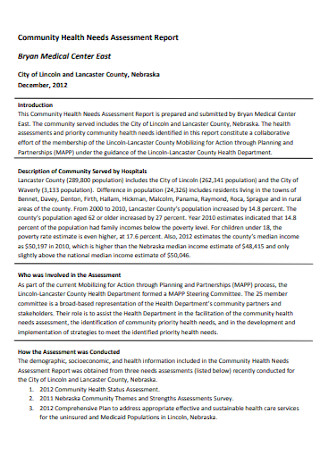
Community Health Needs Assessment Report
download now -
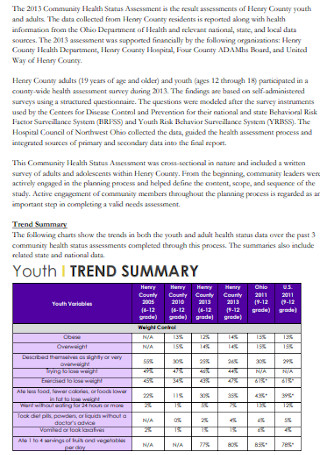
Community Health Assessment Report
download now -
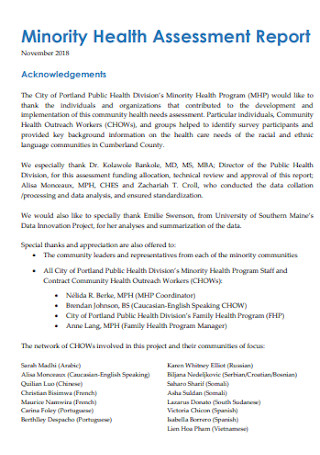
Minority Health Assessment Report
download now -
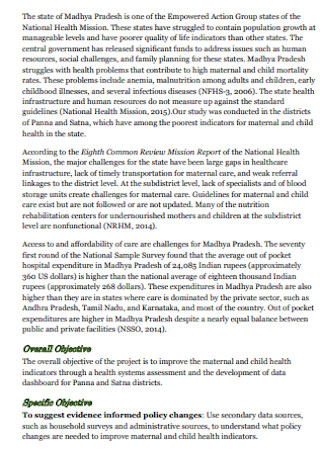
Health Systems Assessment Report
download now -
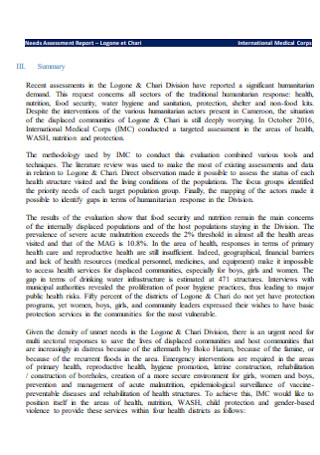
Rapid Health Assessment Report
download now -
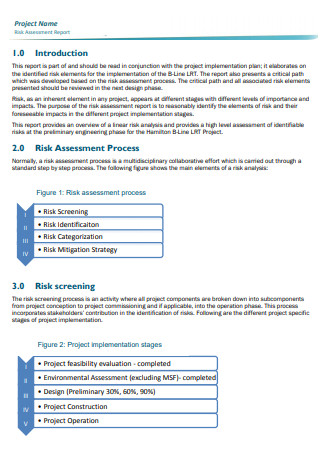
Health Safety Assessment Report
download now -
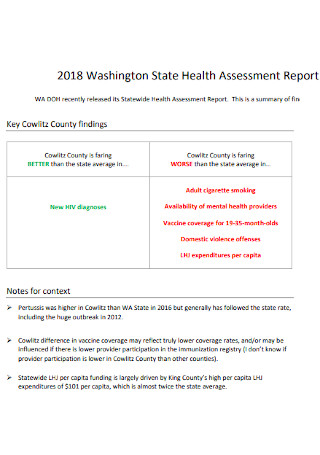
State Health Assessment Report
download now -
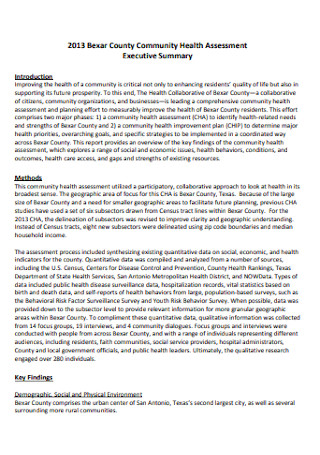
Health Assessment Executive Report
download now -
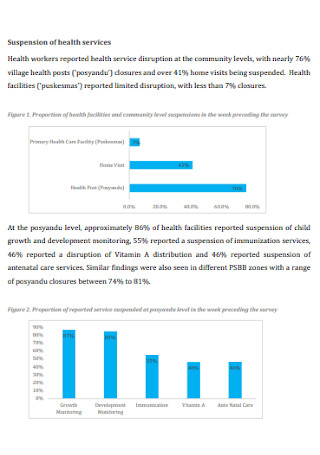
Report of Rapid Health Assessment
download now -
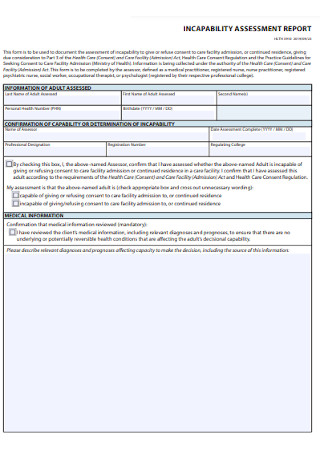
Health Capability Assessment Report
download now -
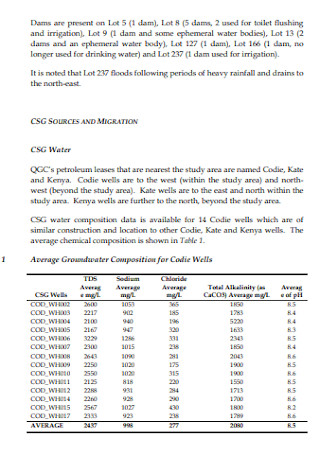
Environmental Health Assessment Report
download now -
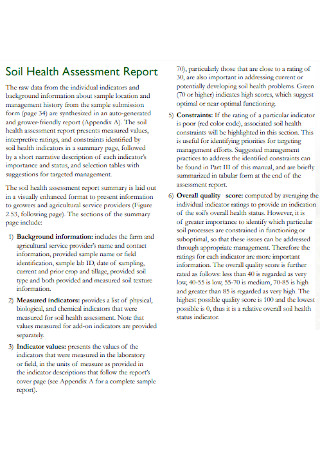
Soil Health Assessment Report
download now -
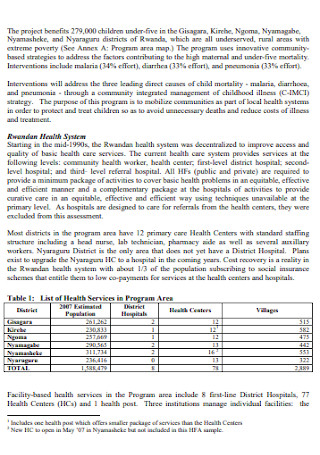
Health Facility Assessment Report
download now -
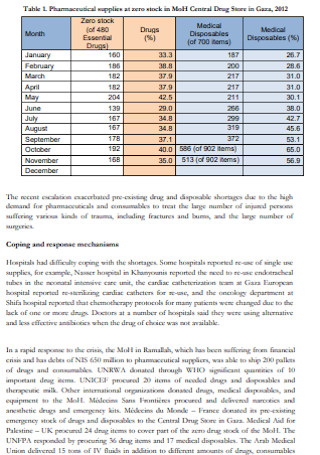
Initial Health Assessment Report
download now -
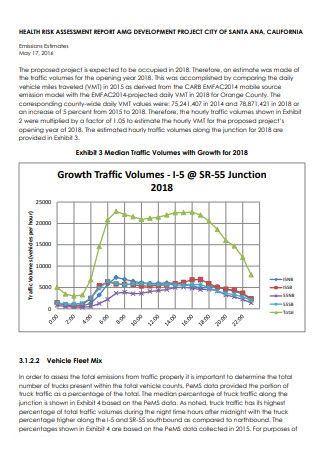
Health Risk Assessment Report
download now
FREE Health Assessment Report s to Download
14+ Sample Health Assessment Reports
What Is a Health Assessment Report?
What Is a Health Assessment?
Signs of Good Health
Benefits of a Health Assessment
Steps On How to Write a Health Assessment Report
FAQS
Do Health Assessments Take a Long Time?
What Is Involved in Health Assessments?
Why Is a Health Assessment Necessary?
What Is a Health Assessment Report?
A health assessment report is a document that details the outcome of the patient’s examination. Any comments about the patient’s condition would be included in the report. The record would also include a review of known ailments and their statuses, as well as the patient’s medication lists. If a medication change is required, it will be noted in the report’s instructional plan section. It is also necessary to update the patient’s medical history by noting any limitations or other problems that are now present. The health assessment report would then conclude with recommendations for additional inquiry or medicine for the patient.
What Is a Health Assessment?
A series of physical exams is used to assess one’s health. It also aids in the detection of early indicators of sickness by analyzing self-reported symptoms and exam results. A comprehensive health assessment provides a medical expert with information about the patient’s physical condition. Inspection, auscultation, palpation, and percussion are among procedures that nurses can use. These techniques are used to conduct a head-to-toe examination to assist distinguish between normal and abnormal conditions.
Signs of Good Health
We desire to live a healthy lifestyle. After all, the repercussions of an unhealthy body are additional constraint and discomfort. Some people who are ill must follow meal plans because they are on a limited diet. Others, considerably more unfortunate, must continuously balance their income and expenses for prescriptions and medical costs. It is true that maintaining one’s health is costly. The inverse, on the other hand, is far worse. Let’s look at the symptoms of excellent health below to get a sense of what a healthy body should look like.
Benefits of a Health Assessment
Assessments provide us with a prognosis and analysis of existing situations and conditions. A community health assessment, for example, would provide an overall picture of the residents as well as their living environment. It would prompt immediate action to correct any issues. No matter how exhausting going through a health assessment is, the end-results are completely worth it. And here are why:
Steps On How to Write a Health Assessment Report
To provide an accurate report to a patient, one must first learn how to create one. A proper health assessment report template could also help with comprehension. And the contents of the report plays the greater role.
Step 1: Patient Information
Patient information is previously collected during the health assessment. A personal data set that includes a person’s name, age, and identification. Weight and height are also considered because they play an important role in the assessment’s result. This information should then correspond with the data on the report. A misspelled name might cause misunderstanding and lead to the wrong patient being diagnosed.
Step 2: Medical History
The patient’s medical history, including their medication list, is reviewed. This includes immunization dates for vaccines, or the doctor who writes the report can add a note of recommended immunization. It is also critical to note that the dates for these immunizations should never overlap. The medical history can be derived from the patient’s previous medical records. It is essential for medical practitioners because it plays a role in the notes they will have to write. Repeated immunization, for example, is simply redundancy. Other redundancies could lead to complications.
Step 3: Underlying Health Problems
Any underlying health issues that a patient is now experiencing should be noted in the report. It is critical to review the state and condition of chronic illnesses, as well as the medications used to treat them. It’s advisable to make a note of everything for both current and future evaluation. Some aspects of the patient’s health may change at any time, and a timely record will assist in resolving the changes.
Step 4: Patient’s Lifestyle
The lifestyle of a patient is crucial in making an assessment. Because a patient may have a smoking or drinking habit. Or if the patient is currently suffering from mental illness and stress because of a high-pressure profession. These kinds of events in a person’s life frequently have an impact on their health. A stressed-out older person may be predisposed to a heart attack or heart-related disorders. This also assists the doctor in determining the etiology of various ailments. It is worth noting that the report provides an outline of why a patient must have suffered from the ailment. It helps explains the situation.
Step 5: Treatment
A treatment is the next thing to be written after acquiring information from the and the result of the health assessment. Taking note of the treatment a patient is receiving or the treatment that is recommended for them. Since it need more examinations for a clearer picture. Treatments should also consider the patients’ emotional state and their ability to endure them. The treatment section should emphasize how a patient’s health can be improved.
Step 6: Additional Notes
If there are any additional notes that do not fall into one of the categories listed above, they should be highlighted afterwards. For instance, a comment about a patient’s receptivity to treatment. A statement expressing a patient’s point of view and complaints about their own health. Some extra notes, such as more inquiry and a focus on nutrition and medication, may be included.
FAQS
Do Health Assessments Take a Long Time?
Some health assessments that do not necessitate examinations or laboratory can be completed in as little as 20 minutes to as much as 2 hours. Because all the patient has to do is fill out a questionnaire and answer questions from medical specialists. It may take a little longer if physical examinations are required.
What Is Involved in Health Assessments?
Aside from the laboratory or examinations performed on the patients, there may be a series of questions they must answer. Questions about any life-changing events, as well as their lifestyle and habits. These are questions on how a patient perceives their overall health.
Why Is a Health Assessment Necessary?
Health assessments provide information about our general health. Furthermore, health assessments aid in the detection of early indicators of illness. They also provide us tips on how to improve our health through diet and lifestyle changes.
Many people would be encouraged to preserve their health if they might become wealthy by doing so. However, good health permits us to move more freely and with less restraint. So, if you’re looking for a sample mental health assessment report or a thorough health assessment example, feel free to check at the examples above!
